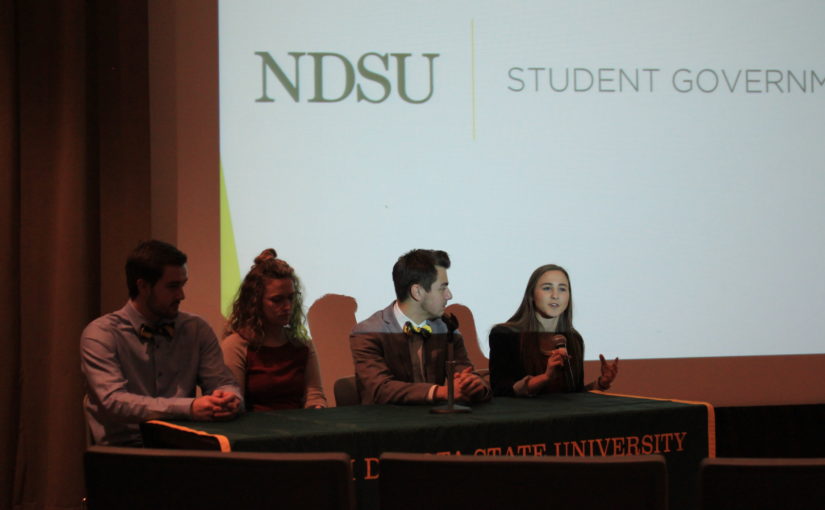THE SPECTRUM | ERIK JONASSON II
Student Government discussing the tuition increase starting fall 2018.
Tuition prices are increasing at NDSU starting the fall of 2018, and to many students this statement is horrifying. Why is tuition increasing? Where does our money already go that we need to be paying more? In Europe there are free universities, so why do we still pay for our education, let alone watch the prices continue to rise?
These were many of the concerns students had when I discussed the change with them. However, after a short explanation and discussion about the student fees, many minds were eased and students began to appreciate the change being made.
The increase in tuition is not huge, only around $200, but it will still greatly affect student course options. The additional fees for certain classes like labs, online courses and studio art courses will no longer exist, making it much more economically friendly to enroll in online classes if you chose to do so.
When discussing the tuition change with Student Government senator Kassidy Skuza, she explained where the change will most greatly affect students.
“This increase may sound frustrating at first, but will essentially be saving students money,” Skuza began. “There are many mandatory classes that are only offered online, so by taking away the extra online course fee students can save money.”
In a continued discussion, there were also comments on how students can save on travel and parking costs as well. With online classes as a normal option free of extra fees, the students will not be required to travel to the main campus if they don’t have to.
One major argument when discussing the tuition change is who this will affect the most. Math, science and engineering students have the most extra fees when it comes to required courses. With labs being a large part of their major, the extra fees add up quickly. When the new tuition is implemented, there will be no more extra fees for these courses, but does that mean that arts and humanities students will be shouldering the weight of the change with no positive change for them?
With many of her classes only offered in an on campus setting, sophomore Erin Tamillo commented on how this change may be slightly unfair to the liberal arts and humanities majors. “Not only are we paying for something that isn’t offered to us,” Tamillo began, “Some students don’t care for online courses due to the lack of face time with a professor.”
Tamillo continued by voicing her opinion on the overall fairness of the change. “It seems unfair that there wouldn’t be a true benefit for people not using the courses that are affected by extra course fees. There should be some sort of benefit within the change for the students still being made to pay.”
As a liberal arts major, I agree. It would be difficult to convince students that are not required to take courses with extra fees that this tuition change will be positive in the end. But with more classes being added to the list of online options and less money spent on parking passes and travel to campus, this change could essentially save students a large sum of money and stress.
